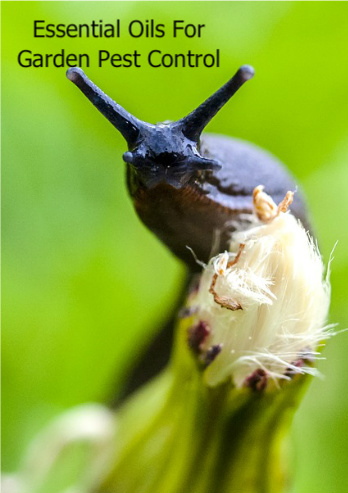- Home
- Uses for Essential Oils
- Garden Pest Control
As an Amazon Associate and affiliate with other programs, I may earn revenue from qualifying purchases through affiliate links. This does not affect the price you pay. Privacy Policy / Disclosures. This site is for educational purposes only.
Garden Pest Control Using Essential Oils
To avoid toxic pesticides in your garden, you can use essential oils for garden pest control. For pests in the home, see essential oils for pest control.

Let's start with an all-purpose garden spray:
- 5 cloves garlic
- 1 cup water
- 1/2 teaspoon cayenne powder
- 1/4 teaspoon peppermint essential oil
- 1/4 teaspoon rosemary essential oil
- 1/2 teaspoon biodegradable liquid dishwashing detergent
- Put the garlic, water, and cayenne in a blender and mix.
- Strain the mixture through a fine strainer (or through a larger strainer and then through a coffee filter). The mixture needs to become fine enough to spray through the nozzle of a spray bottle.
- Stir in the essential oils and liquid dishwashing detergent.
- Pour the mixture into a spray bottle.
- Spray on your garden plants.
Unused portions can be stored for several days in a cool place.
Source: Essential Oils & Aromatherapy for Dummies
General Garden Pest Control
To prevent pest problems on plants, use one of the following essential oil blends in one gallon of water:
- 10 drops sage + 5 drops clove
- 10 drops thyme + 5 drops lavender
- 8 drops cinnamon + 7 drops peppermint
- 10 drops clove + 5 drops bay
First, water your plants as usual. Then, spray the water/essential oil mixture onto the plants.
If your plants are already infested with insects, you need a stronger mixture. Here's one possibility:
- 45 drops thyme
- 45 drops sage
- 1/2 cup water
Mix oils and water in a spray bottle. Shake well. Mist the plant lightly. You can repeat application every 2 to 3 days until the insects are gone.
Source: 500 Formulas For Aromatherapy
Essential Oils for Specific Garden Pests
For specific pest control for aphids, put 2 quarts salt water in a spray bottle and add 15 drops orange and 10 drops spearmint. Shake the mixture well and spray on plants. Other essential oils that might work are cedarwood, hyssop, or peppermint.
Here are some more essential oils for specific garden pests:
Beetles: peppermint, rosemary, thyme
Caterpillars: peppermint, sage, rosemary, spearmint, thyme
Cutworm: sage, thyme, peppermint, rosemary
Fleas: lavender, lemongrass, peppermint, citronella, rosemary, thyme
Flies: lavender, peppermint, rosemary, basil, spearmint
Gnats: patchouli, spearmint, cinnamon, lemongrass
Lice: peppermint, spearmint, cedarwood, basil
Mites: eucalyptus, lemongrass, peppermint
Slugs: cedarwood, clove, peppermint, pine
Snails: cedarwood, patchouli, lemongrass, clove
Ticks: citronella, lemongrass, rosemary, thyme, clove, peppermint
Weevils: cedarwood, patchouli
Source: The Complete Book of Essential Oils and Aromatherapy
Citrus essential oils may also work. They contain linalol and d-limonene, which kill the following insects, according to The Organic Gardener's Handbook of Natural Pest and Disease Control:
- Aphids
- Fire Ants
- Fleas
- Flies
- Leaf-eating caterpillars
- Mites
- Roaches
- Wasps






